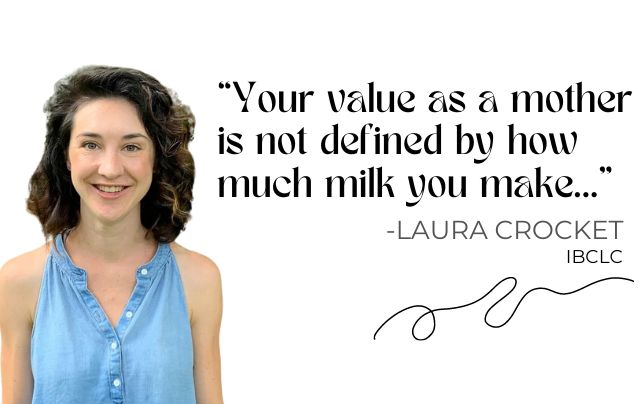In the recovery room after my c-section, a nice woman popped her head in and cheerfully asked if I needed lactation support. She was at least the fifth person to come into our room within the hour and I was extremely nauseous from pain medicine. Between bouts of throwing up, one of the nurses had put my son on my breast and we thought he latched so I told the lactation specialist we were fine. Really, I just needed to rest!
A few hours later, nurses weren’t sure whether my son was in fact latching. They suggested I manually express my colostrum and give it to my son in a syringe so we could be sure he was getting enough. I agreed and so when the lactation specialist came by the next day, I told her what we were doing. She said I was doing a great job and left. We were discharged from the hospital that day.
Back at home and anxiously awaiting my milk to come in, my husband and I realized we really had no idea if our son was eating enough while he was on my breast and we knew very little about the pump we had purchased. With all the research I did during pregnancy, I realized that I essentially skipped anything related to breastfeeding. I naively thought it would come naturally!
By the time my husband and I scheduled a lactation specialist, we had already been home for about a week. It would be another 2.5 weeks until we would be seen! During that time, I got a terrible case of mastitis (almost ending up in the hospital), I went from producing too much to too little, and I still felt like I had no idea what I was doing. To make matters worse, the only time I felt like I had any post-partum anxiety was during breastfeeding and pumping. Both felt incredibly overstimulating and involved pain and/or our son crying.
All that to say, I really wish I had seen a lactation specialist before giving birth! They help with nursing (duh!) but they also measure your nipple size (yes, that’s an important thing!) and they teach you how to use your pump correctly. Often, they come to your home which means you can be relaxed and in your own environment.
I asked my lactation consultant, Laura Crocket of Highland Lactation, if she would answer a few questions for the blog. If you’re intown Atlanta and need lactation support, I highly recommend booking her for an in-home visit.
Admittedly, lactation support isn’t something that crossed my mind before pregnancy. What is your background and what led you to this career?
My background is in food. I guess you could say I’m still in the business of making sure everyone gets fed, but from a different angle. I had a two year old and was doing recipe development at an Italian restaurant when I realized I wanted to do something with more flexibility and family friendliness. I stumbled into lactation when I saw that another lactation consultant in the area was looking for an intern to train and I thought I’d see what the lactation business was about. I thought it would be pretty straightforward and didn’t realize that every mother/baby pair is a unique puzzle. That was close to 7 years ago and I’ve never looked back!
From my understanding, there can be physical difficulties like a tongue tie that makes feeding difficult and there can also be emotional barriers (my supply still plummets if I’m having a stressful day!). What are some of the things moms should look out for?
There are so many complexities to feeding, especially because there is an interplay involving two people. It can be challenging to figure out what is going on with mom’s supply and with baby’s suck and how those things are affecting each other. Some of the things to look out for are nipple or breast pain with feeding, inadequate infant weight gain or excessive weight loss in the early days (I recommend frequent weight checks over the first couple of months if you aren’t sure how things are going), and long frequent feeds or a frequently inconsolable baby. By long and frequent I mean regularly taking an hour+ to feed and needing to feed less than every 2 hours around the clock.
During my first few weeks postpartum, I found myself binge-buying lactation accessories from Amazon in the middle of the night. From nipple shields to a manual pump and seemingly everything in between. Are there a few products you recommend pregnant mamas have on hand? Or maybe a product you think most moms should skip?
There are so many products out there being marketed to new parents that it makes my head spin! Since quick shipping is available to most with places like Amazon, I suggest starting pretty minimalist and seeing what you need. If you plan to nurse, it’s nice to have a supportive pillow like a My Breast Friend and an electric pump like a Spectra. This is by no means an exhaustive list, but a few things I’d have on hand are a slow flow bottle, velcro swaddle, a changing table that you can wipe off like Keekaroo, and a soft stretchy wrap like Solly Baby. For things to skip, I don’t love the options in the curated boxes with bottles and pacifiers.
I talked about my own breastfeeding experience and why I wished I had seen you sooner (preferably, before my son was born!). When do you recommend moms schedule your services? And is it ever too late to see a specialist?
For first time moms and people who have had a previous breastfeeding experience that didn’t go as planned, I would love to see you prenatally (ideally around 35 weeks)! This is often covered by insurance and can be more helpful than a group class because we cover your specific goals and health history, choosing the right pump, correct flange sizes, and bottles to start with. It’s also nice to already know your lactation consultant ahead of the birth because you can have a plan in place and point of contact already set up, so less to worry about.
On the flip side, if you’ve tried everything on your own and still need help well into your journey, it is truly never too late. Making milk is a supply and demand process, so even if you’ve never lactated or your milk supply has dwindled, there are options ranging from relactation to learning to use a supplemental tube at the breast to feed the baby. A good lactation consultant will not have an agenda when it comes to feeding your baby, but will create a plan that works toward your goals.
If there was one thing you wished all breastfeeding moms knew, what would it be?
The first thing I want every person who is trying to breastfeed to know is that your value as a mother is not defined by how much milk you make. Making more milk doesn’t prove you love your baby more. It is largely genetic, and circumstantial around your birth with many factors that are out of your control. This isn’t relevant to all breastfeeding people, but I have come across MANY cases where moms have gotten tunnel vision about doing everything possible to increase milk supply and have sacrificed so much in the process. In my opinion, your baby needs you, present and healthy, more than you making more milk. There are obviously some cases where it is more complicated than that, but it’s important not to lose sight of your value as a mother beyond just a person who provides sustenance.
A second thing I wish all breastfeeding parents knew is about the physiology of milk production. You can’t teach your body to only make milk during the day. Nighttime emptying (pumping or nursing) is critical to maintain milk supply. The scheduling books like Moms On Call conveniently leave out that your milk supply will generally tank with early sleep training. I hate having to tell people that because we all desperately need sleep and sometimes sleeping is the right thing to do for your mental and physical health, even if it lowers milk supply. So I’m not opposed to sleep training or mom skipping overnight feeds while a partner takes over, but it’s something you should know so you can make informed decisions about how long to go without breast emptying overnight.
This post may contain affiliate links so I may receive compensation if you sign up for or purchase products linked.




This blog with the lactation consultant is so interesting, I did not want it to end. I wanted to hear more!